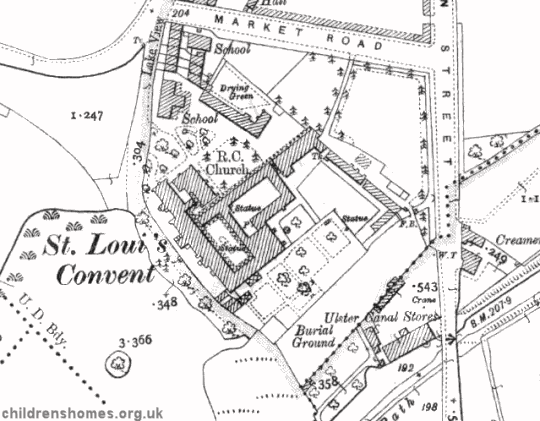Spark's Lake Reformatory, Monaghan, Ireland
On July 29 1859, the Monaghan Reformatory for Roman Catholic Girls was opened at Spark's Lake, Monaghan. It was the only such institution in the province of Ulster. The premises could accommodate up to 60 inmates.
An inspection in June 1861 recorded 23 inmates under detention. The girls were employed in the laundry, at needlework, and in the dairy and piggery. There were two paddocks and a good garden, which also afforded employment to the girls. The superintendent was Mrs Genevieve Beale, a Sister of the order of St Louis.
The inspection report for 1870 noted that the institution had particular difficulties to contend with. All the most corrupt and refractory girls found incorrigible in other institutions were received here, as well as those labouring under conditions such as epilepsy, who were refused by the managers of reformatories elsewhere. Mrs Beale was said to have succeeded in thoroughly reforming girls who had been considered incorrigible in other schools, but who were now well conducted and holding respectable position in life.
The School site is shown on the 1900 map below.

Monaghan Reformatory site, Monaghan, c.1900.
The 1872 inspection report noted that the schools of the establishment were taught under the Commissioners of National Education and were attended by the children of the inhabitants of the town. The children were now taught needlework, shirt making, and dressmaking. They instructed in the use of the sewing machine and made all the dresses they wore. They made lace and understand embroidery. They worked in the laundry on three days in the week. They milked cows, made butter, and fed pigs and poultry. They worked in the bakehouse, and cooked for the Sisters and a school for young ladies attached to the convent. It was said that the Sisters joined with the children in their amusements, never left them, and gradually acquired a positive influence over them. In 1873, hot baths were installed for the inmates.
The death occurred in 1877 of Mrs Genevieve Beale. She was succeeded as manager by Mrs Angela Crotty, who was assisted by six of the St Louis Sisters.
In 1880, additions to the buildings included a new laundry, dormitory, lavatory and bathroom. The new laundry was constructed that the drying closet could be used at the end of each week, when the laundry work is completed, as a sweating room for a Turkish bath, in which the children could have all the advantages of such a facility without the expenditure of extra fuel which a normal Turkish bath generally entailed. A hot water plunge bath was also provided. The plunge bath was lined with white marble and the slabs and basins of the lavatory were also of marble. A lecture room for instruction in cookery was fitted up in the institution, and a water main was laid down from the adjoining lake by which a plentiful supply of water could be obtained. The inmates were placed into separate classes to remove the younger ones from the possibility of 'contamination' from the older and more vicious girls. The manager of the institution was now Mrs M.X. Finegan. The average daily number of inmates in 1880 was 65.
In 1883, the sum of £150 was expended on the erection of additional farm offices, and a covered recreation-hall for the children in which to exercise during wet weather. Following the closure of the Ballinasloe Reformatory in 1884, a number of its inmates were transferred to Spark's Lake, entailing the enlargement of one of its dormitories. The official capacity of the site was also increased to 70 places.
In the years that followed, the number of girls being committed to Spark's Lake gradually declined, with just 23 under detention at the end of 1902. The institution's certificate was withdrawn on 6 October 1903, with the remaining inmates having been transferred to the Limerick Reformatory on 21 September.
The St Louis Secondary School now occupies the Spark's Lake premises.
Records
Note: many repositories impose a closure period of up to 100 years for records identifying individuals. Before travelling a long distance, always check that the records you want to consult will be available.
Bibliography
- Carpenter, Mary Reformatory Schools, for the Children of the Perishing and Dangerous Classes, and for Juvenile Offenders (1851, General Books; various reprints available)
- Carlebach, Julius Caring for Children in Trouble (1970, Routledge & Kegan Paul)
- Higginbotham, Peter Children's Homes: A History of Institutional Care for Britain's Young (2017, Pen & Sword)
- Abel Smith, Doroth Crouchfield: A History of the Herts Training School 1857-1982 (2008, Able Publishing)
- Garnett, Emmeline Juvenile offenders in Victorian Lancashire: W J Garnnett and the Bleasdale Reformatory (2008, Regional Heritage Centre, Lancaster University)
- Hicks, J.D. The Yorkshire Catholic Reformatory, Market Weighton (1996, East Yorkshire Local History Society)
- Slocombe, Ivor Wiltshire Reformatory for Boys, Warminster, 1856-1924 (2005, Hobnob Press)
- Duckworth, J.S. The Hardwicke Reformatory School, Gloucestershire (in Transactions of the Bristol and Gloucestershire Archaeological Society, 1995, Vol. 113, 151-165)
Links
- Glencree Reconciliation Centre (former Reformatory site)
- The Commission to Inquire into Child Abuse
Except where indicated, this page () © Peter Higginbotham. Contents may not be reproduced without permission.


